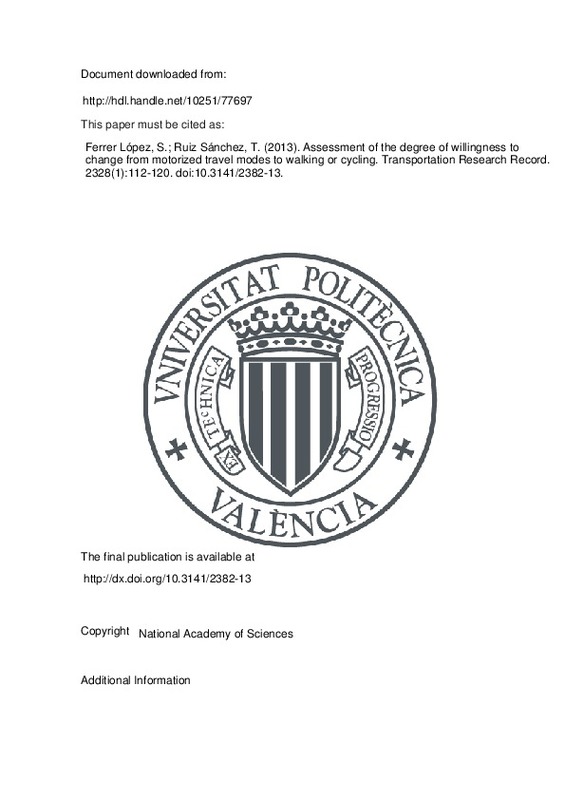JavaScript is disabled for your browser. Some features of this site may not work without it.
Buscar en RiuNet
Listar
Mi cuenta
Estadísticas
Ayuda RiuNet
Admin. UPV
Assessment of the Degree of Willingness to Change from Motorized Travel Modes to Walking or Cycling
Mostrar el registro sencillo del ítem
Ficheros en el ítem
| dc.contributor.author | Ferrer, S.
|
es_ES |
| dc.contributor.author | Ruiz Sánchez, Tomás
|
es_ES |
| dc.date.accessioned | 2015-02-24T08:33:12Z | |
| dc.date.available | 2015-02-24T08:33:12Z | |
| dc.date.issued | 2013 | |
| dc.identifier.issn | 0361-1981 | |
| dc.identifier.uri | http://hdl.handle.net/10251/47416 | |
| dc.description.abstract | This paper presents an analysis of the degree of willingness to change from motorized travel modes to walking or cycling. The aim of the analysis is to reduce uncertainty between stated willingness to change and real shifts from car or transit to nonmotorized transportation modes. Data were collected in the city of Valencia, Spain, through a novel data collection effort based on multiple survey methods. Respondents traveling by car or transit were asked about their willingness to change to walking or cycling under the implementation of improvement measures to be selected. Then a hypothetical scenario was presented to respondents who stated a willingness to change; in the scenario, the previously selected measures were implemented and respondents were supposed to be cycling or walking. In addition, the costs of their usual travel mode were gradually reduced until they gave up cycling or walking. Those who decided to keep on walking or cycling were assumed to have a strong willingness to change. A statistical analysis performed with Heckman's sample selection model permitted identification of demographic, socioeconomic, and travel-related factors influencing the degree of willingness to change. Results revealed that car users presented a stronger willingness to switch to walking or cycling than transit users. In addition, older respondents showed a stronger willingness to change to both walking and cycling. Work- and school-related journeys were less associated with walking than noncommuting journeys, but they were more related to cycling. Policy implications of the results are highlighted. | es_ES |
| dc.language | Inglés | es_ES |
| dc.publisher | National Academy of Sciences | es_ES |
| dc.relation.ispartof | Transportation Research Record | es_ES |
| dc.rights | Reserva de todos los derechos | es_ES |
| dc.subject.classification | INGENIERIA E INFRAESTRUCTURA DE LOS TRANSPORTES | es_ES |
| dc.title | Assessment of the Degree of Willingness to Change from Motorized Travel Modes to Walking or Cycling | es_ES |
| dc.type | Artículo | es_ES |
| dc.identifier.doi | 10.3141/2382-13 | |
| dc.rights.accessRights | Abierto | es_ES |
| dc.contributor.affiliation | Universitat Politècnica de València. Departamento de Ingeniería e Infraestructura de los Transportes - Departament d'Enginyeria i Infraestructura dels Transports | es_ES |
| dc.description.bibliographicCitation | Ferrer, S.; Ruiz Sánchez, T. (2013). Assessment of the Degree of Willingness to Change from Motorized Travel Modes to Walking or Cycling. Transportation Research Record. (2382):112-120. doi:10.3141/2382-13 | es_ES |
| dc.description.accrualMethod | S | es_ES |
| dc.relation.publisherversion | http://dx.doi.org/10.3141/2382-13 | es_ES |
| dc.description.upvformatpinicio | 112 | es_ES |
| dc.description.upvformatpfin | 120 | es_ES |
| dc.type.version | info:eu-repo/semantics/publishedVersion | es_ES |
| dc.description.issue | 2382 | es_ES |
| dc.relation.senia | 257487 |







![[Cerrado]](/themes/UPV/images/candado.png)

